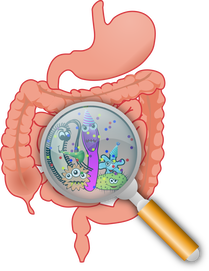
In macrobiotic teachings from the 70’s, gut health was known as intestinal health. Since I started teaching and counseling people about natural health in the 70’s, I’ve focused on gut health as a key to health.
New information since then explains how intestinal or gut health not only plays a role in digestion and elimination but also in immune health. A large percentage of the immune cells of the body are near the large intestines. The most likely reason for their location is to neutralize bad bacteria in the large intestines. If bad bacteria enter the body it can cause sickness.
The large intestines are home to millions of bacteria somewhere between two to six pounds. These bacteria provide important functions such as the synthesis of folic acid and valuable nutrients from foods including vitamins K and portions of the B complex. Good bacteria is thought to aid in digestion, elimination, and aspects of immunity.
When the bacteria become imbalanced, the immune system and elimination slows down. About 60 million people suffer from constipation in the U.S. This causes an imbalance in the bacteria in the colon that could lead to irritable bowel syndrome, colitis, colon cancer and other serious bowel disorders. Technically, bad bacteria in the colon is called dysbiosis. When bad bacteria over grows, it can enter the small intestines and interfere with the absorption of nutrients.
The modern diet which is low in fiber, high in sugar and poor-quality fats is a major cause of bacterial overgrowth and poor gut health. Natural diets that also contribute to poor bowel health are diets that are low carb, raw foods diets and imbalanced vegan diets. Each of these diets are missing nutrients that are important for the bowel.
Gut health is supported by whole grains, beans, cooked vegetables and some fruit. The fiber in these foods feed the good bacteria. Fermented foods such as non-vinegar, chemical free pickles, kvass - a fermented drink from rye or beets, miso, and yogurt can help feed the healthy bacteria.
Moderate amounts of olive oil and coconut oil are naturally anti -bacterial. Adequate protein in the diet will lead to strong muscles in the colon and digestive tract ensuring healthy peristalsis - movement through the digestive tract. Adequate proteins are gotten from natural meats such as grass-fed beef, wild fish, pastured chicken, eggs and raw cheese or good quality protein powders for vegans. Although the use of protein powders as a subsitute for natural unprocessed animal proteins will not be fully known until they are used for many decades and generations, and records of the results are studied. It is our hope that they will substitute adequately.
To keep the metabolism high, I suggest that vegans and vegetarians take certain supplements. Diets lacking any important nutrients put the body in stress and lower the metabolism slowing down the colon function. In addition, good lifestyle practices include limiting stress, adequate sleep, regular eating and daily exercise helps keep circulation flowing for good intestinal health.
I suggest the use of probiotics when someone takes antibiotics. Yet, probiotics if taken too long can lead to an overgrowth of good bacteria that can negatively impact your health. The only probiotic that I recommend for daily use is one made from soil. It is called Bodybiotics. It supports your intestinal flora but does not create an overgrowth. You can find out more about Bodybiotics at my website.
https://www.macrobiotic.com/health-products.html Bodybiotics
https://www.macrobiotic.com/how-to-be-safe-on-a-vegan-diet-not-vagen.html





 RSS Feed
RSS Feed